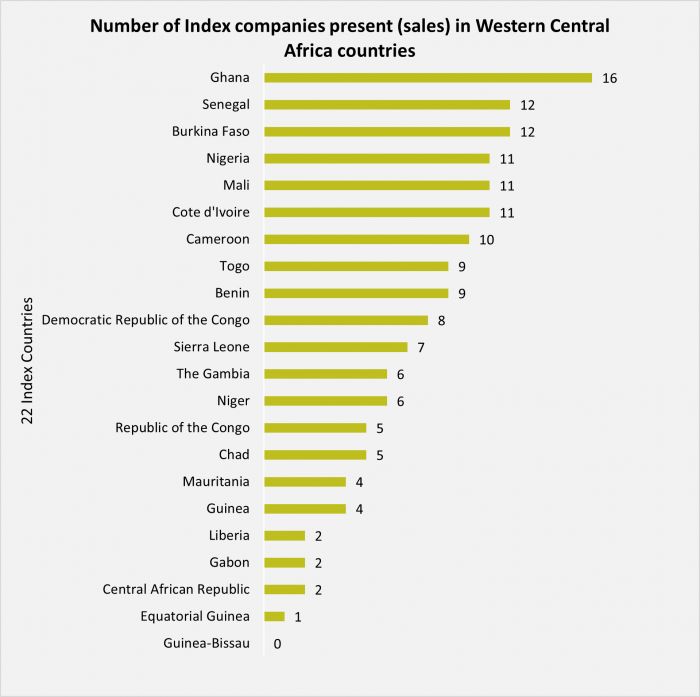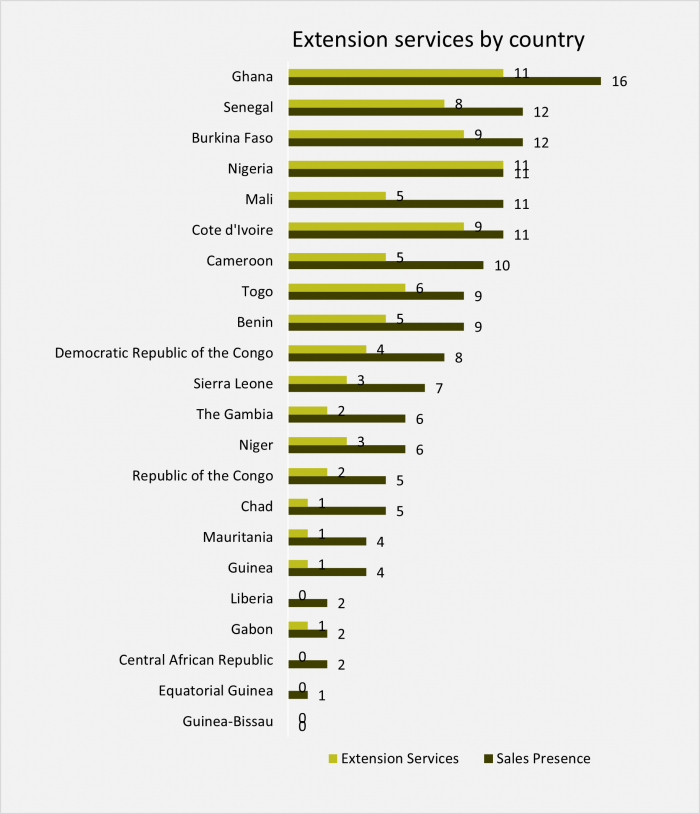Regional finding
Key findings for Western and Central Africa
Hunger is a daily reality for almost one billion people around the world. In 2020 alone, an additional 148 million faced hunger, owing to the COVID-19 pandemic, climate variability, conflict, and economic downturn. Many of the world’s 400 million small-scale farmers live and work precisely in regions affected and considered food insecure. As producers of a large part of the world’s food, they are key to meeting daily and future food demands. Therefore, they should be empowered as active agents for achieving the UN SDGs, explicitly ensuring food security, ending hunger, eradicating poverty, conserving biodiversity, and achieving environmental sustainability. At the start of the food value chain, the seed industry plays a crucial role in sustainable food systems.
The Access to Seeds Index highlights the efforts of seed companies to improve access to seeds for smallholder farmers in emerging economies. Small-scale farmers often lack opportunities to access markets and can benefit significantly from increased knowledge, technology, and resources that companies can provide. The index seeks primarily to identify leadership and good practices across the seed industry, providing an evidence base for discussing where and how companies can step up their efforts.
In 2016, the first Access to Seeds Index found that global seed companies largely overlooked Western and Central Africa. However, regional experts pointed out that those findings ignored the emergence of homegrown seed actors. In 2019, ATSI assessed the efforts of 23 leading seed companies in the region, a mix of global, African, and Western and Central Africa based ones, for the first time. In 2019 the index focused on 23 index countries with high food insecurity and low yield production. The index showed significant contributions by homegrown seed companies mainly through seed production and sales, but the Western and Central Africa region lacked active private breeding programs and smallholder farmer’s capacity-building activities.
The 2021 Access to Seeds Index evaluates the efforts of 32 leading companies in Western and Central Africa on six measurement areas. Showing a presence with sales of both global and regional companies in 21 indexed countries except Guinea-Bissau. Company extension services support sales in 18 countries, six more countries than in 2019, but are entirely lacking in countries. The companies also provide farmers with diverse crop portfolios, including local crops important for smallholder farmers. Overall, the seed industry in the region is still in its early stages of maturing. A few companies, mainly regional, invest in local business activities such as breeding programs, seed production, and seed processing, particularly in Nigeria, Ghana, Burkina Faso, and Côte d’Ivoire. Some companies involve smallholder farmers in seed production activities to produce seeds under contractual arrangements, which helps generate income and transfer knowledge. An area of improvement identified within business activities was the lack of adequate systems to ensure social and labour standards across seed production activities.
Regional seed companies still prioritise sales in their home country; only a few companies have a regional presence
In Western and Central Africa, almost all index countries have two or more companies present with the most presence in Ghana (16 companies), Senegal (13), Nigeria (13), and Burkina Faso (13). The only country with no company presence reported in 2021 is Guinea-Bissau.
Eighteen companies offer extension services to small-scale farmers in 18 of the 22 countries six more than in 2019
Companies reporting extension services in the region have increased since 2019 from 12 index countries to 18 countries in 2021. In addition, while there was an increase in programmes offered to next-generation farmers, companies should also pay attention to programmes explicitly targeted towards women.
The majority of the seed companies' portfolios are diverse for vegetable and field crops
Smallholder farmers should have enough seed of suitable crops for critical sowing periods and in a continuous and reliable supply. The majority of the seed companies’ portfolios in Western and Central Africa are diverse for vegetables and field crops. Seven companies also reported offering local crops, reaching from African eggplant and Brede mafane to yam.
Nigeria, Ghana, Burkina Faso, and Côte d'Ivoire attract most of the companies for investment in business activities
Business investments by companies are mentioned for only eight countries: Nigeria, Ghana, Burkina Faso, Cote d’Ivoire, Cameroon, Senegal, Mali, and Benin. Eleven companies have one or more breeding locations in the region, in total seven countries. Fourteen companies invest in seed production activities in 7 countries: Nine companies have seed processing locations, but only in 4 countries in total.

